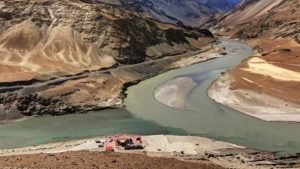World Bank has said that India is allowed to construct hydroelectric power facilities on tributaries of the Jhelum and Chenab rivers with certain restrictions under the 1960 Indus Waters Treaty (IWT). World Bank’s comments came as officials from India and Pakistan concluded the secretary-level talks over the IWT.
Background Information:
In 2016, Pakistan had raised objections to construction of two hydropower projects named ‘Kishanganga’ – on Indian side of River Jhelum’s tributary and ‘Rattle’ – on Indian side of River Chenab, stating that these projects contravened the IWT.
- Pakistan had asked World Bank to facilitate the setting up of a Court of Arbitration to look into its concerns about the designs of the two hydroelectric power project, whereas India had asked for the appointment of a neutral expert to look into the issues, contending the concerns Pakistan raised were technical ones.
World Bank’s Comments:
This week World Bank said the IWT designates Jhelum, Chenab and Indus as the “Western Rivers” to which Pakistan has unrestricted use, however India is permitted to construct hydroelectric power facilities on these rivers subject to 
- World Bank added that India and Pakistan have agreed to continue discussions and reconvene in September 2017 in Washington DC.
- It is to be noted that World Bank’s role in relation to differences and disputes is limited to the designation of people to fulfil certain roles when requested by either or both of the parties
Facts about Indus Waters Treaty (IWT):
IWT is a bilateral treaty between India and Pakistan that lays out terms and conditions for sharing waters of Indus River System.
- It was signed in year 1960 between the then Prime Minister of India Jawaharlal Nehru and the then President of Pakistan Ayub Khan. The World Bank played a crucial role as a mediator.
- As per the terms of this treaty, India has exclusive rights over waters of River Sutlej, River Beas and River Ravi, whereas Pakistan was granted exclusive rights over River Jhelum, River Chenab and River Indus.
- As the Rivers over which Pakistan has been granted exclusive rights, flow through Indian Territory, IWT permits India to make non-consumptive use of its water viz. for power generation, transport and irrigation.
- The treaty also brought into existence ‘Permanent Indus Commission’ for resolving any future disputes relating to the treaty. Both, India and Pakistan have a Commissioner appointed to this Commission.